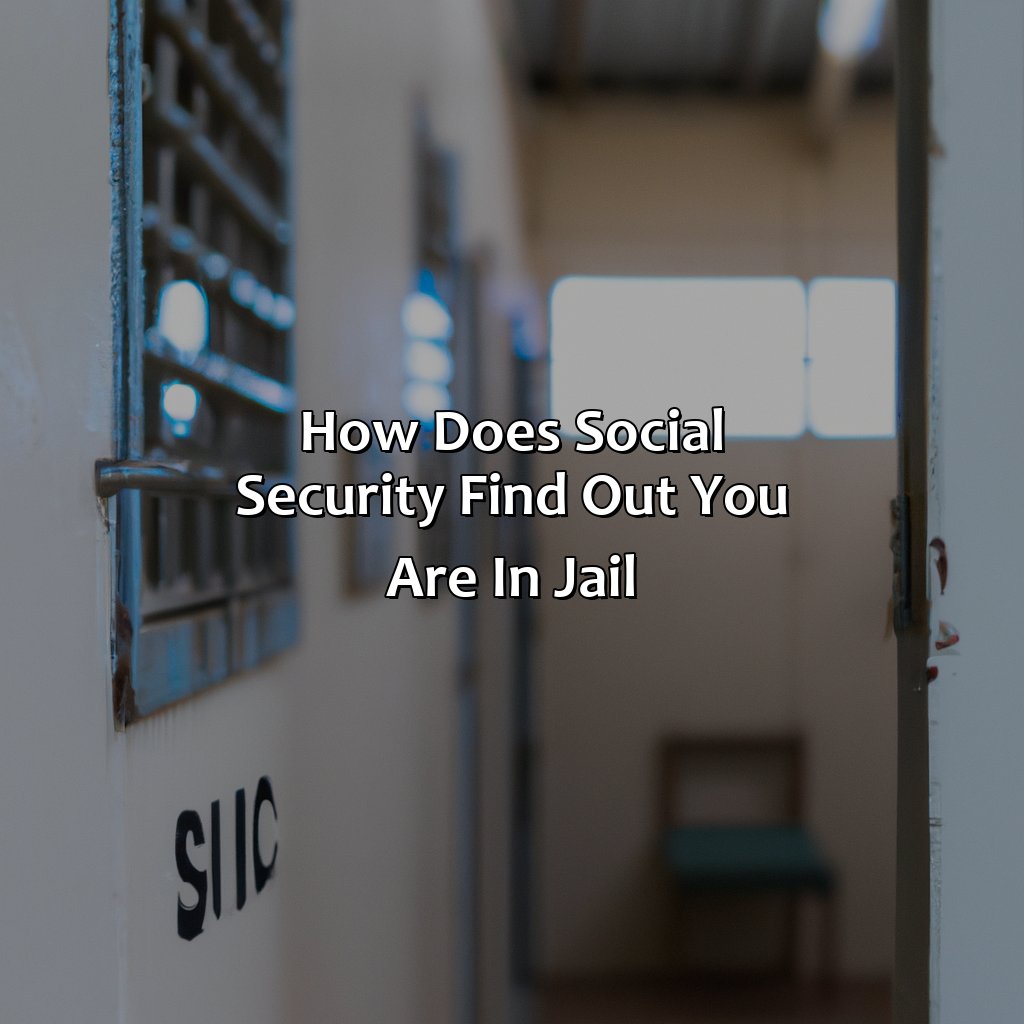How Does Social Security Find Out You Are In Jail?
Key Takeaway:
- Social Security checks inmate status through data provided by both federal and state prisons as well as prison authorities, and benefits may be suspended if an inmate is found to receive them illegally.
- Overpayment issues may also arise if benefits continue to be paid after an individual has been incarcerated, leading to debt that must be repaid upon release.
- Inmate status can be reported to Social Security through self-reporting or by family members or third-parties to prevent wrongful benefits and potential penalties.
Do you worry about how Social Security knows if you are in jail? You don’t need to worry anymore. In this blog, you’ll learn the answer to the question of how Social Security finds out if someone is in jail.
Social Security System
The system responsible for providing social security benefits to eligible individuals is a crucial aspect of public welfare. This system operates under the governance of federal and state laws and regulations. It is designed to cater to the basic needs of individuals, such as retirement, disability, and survivors’ benefits. Individuals qualify for social security benefits by fulfilling specific criteria, such as having worked for a designated number of years and paid into the system. The eligibility criteria differ for each type of benefit program.
The Social Security System takes several measures to ensure that the benefits provided are legitimate and are going to those who qualify for them. One such measure is to ascertain the whereabouts of beneficiaries. This is essential to avoid fraudulent claims, deter overpayments, and prevent ineligible individuals from receiving benefits. Social Security Administration (SSA) gathers information about its beneficiaries from various sources, including federal and state governments, employers, financial institutions, and other third-party sources. Specifically, to determine if a beneficiary is in jail or prison, the SSA relies on the Prisoner Update Processing System (PUPS) and the Prisoner Update Processing System II (PUPS II). These systems receive information from state and federal correctional facilities and allow the SSA to freeze or stop benefits for individuals incarcerated for more than 30 days.
It is important to note that Social Security benefits are subject to change and can be suspended or terminated at any time, depending on the circumstances. Social Security law often changes, and its interpretation is subject to various court rulings and administrative decisions. For instance, in a recent case, SSA was penalized for violating a provision of the Social Security law, which prevents it from paying benefits to individuals with outstanding arrest warrants for fleeing prosecution or violating probation or parole.
According to a report by Forbes, in 2020, more than one million people received Social Security benefits while behind bars, and the federal government paid about $1.3 billion in benefits to prisoners.
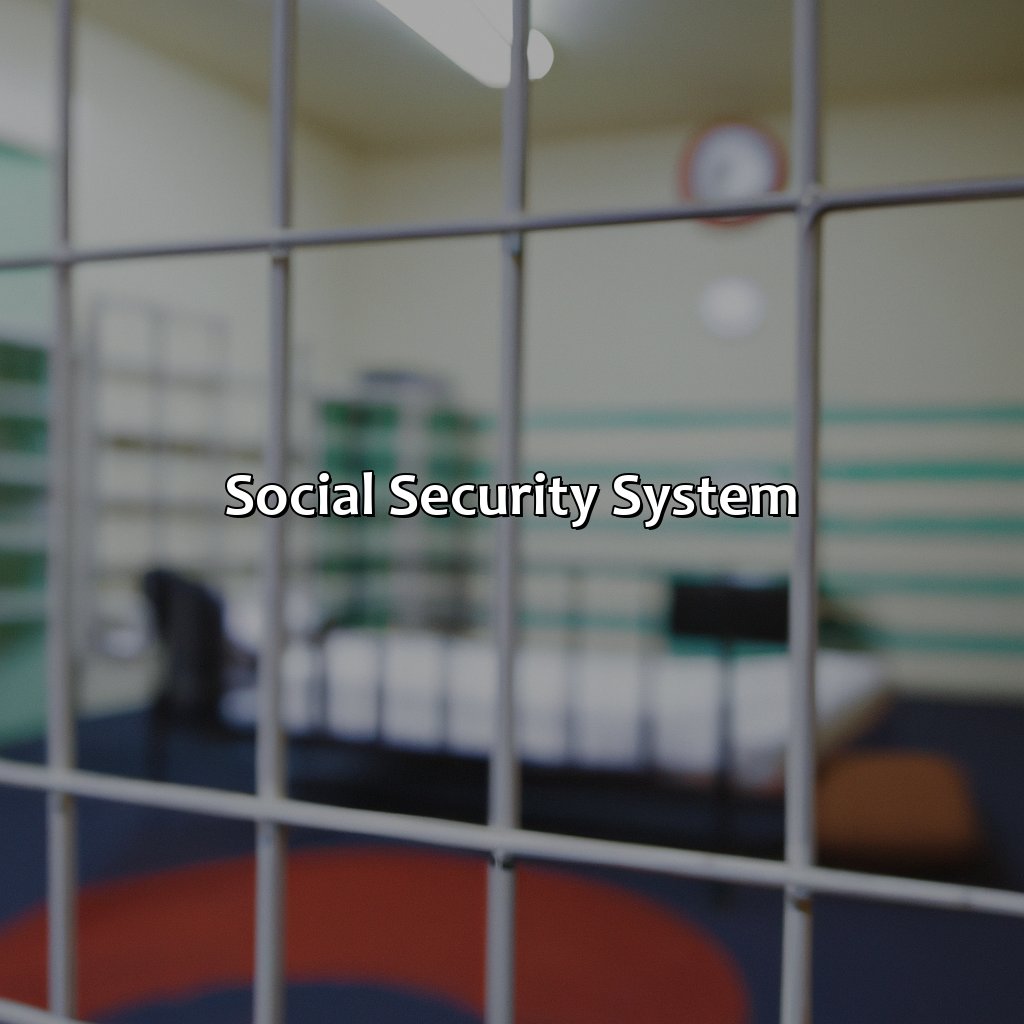
Image credits: retiregenz.com by David Jones
Inmate Status in Social Security
Two main ways determine your inmate status for social security benefits. Data gathers from federal and state prisons. It also comes from prison authorities. Let’s explore each method. How does each one identify your inmate status?
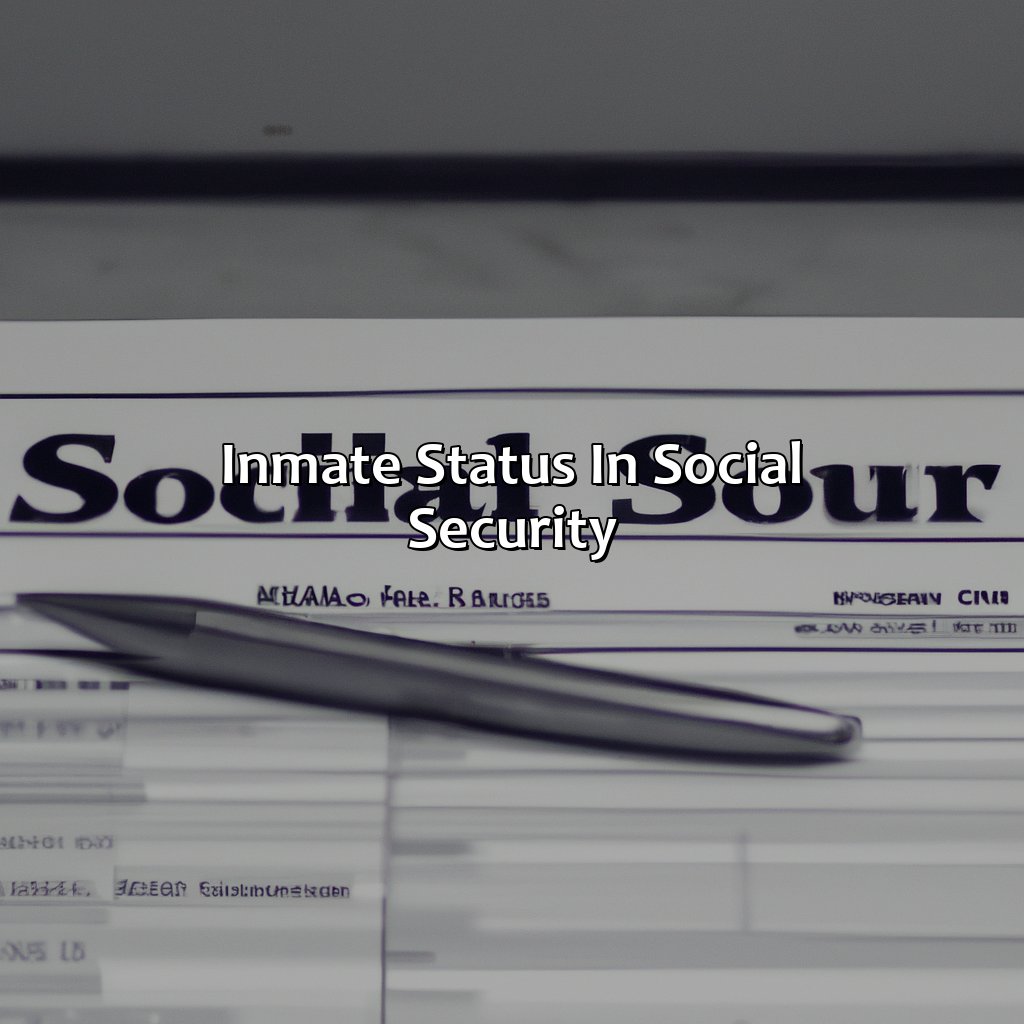
Image credits: retiregenz.com by Joel Arnold
Inmate Data from Federal and State Prisons
Data regarding incarcerated individuals in both federal and state prisons is used by Social Security to determine eligibility for benefits. The agency obtains inmate information through various means such as data sharing agreements, inmate self-reporting, and verification from correctional facility personnel.
A table with relevant columns can provide a clearer understanding of the types of data collected. Some examples of information collected include the inmate’s name, Social Security number, date of birth, conviction status, and release date.
It is important to note that certain benefits may be suspended or denied while an individual is incarcerated, depending on the type of benefit and length of incarceration.
In 1965, the Social Security Act was amended to prohibit payment of benefits to individuals in jail or prison for more than 30 days. This clause was added due to concerns that taxpayer funds would be used to support convicted criminals.
You know you’re in trouble when even the prison authorities are giving out your personal data.
Inmate Data Provided by the Prison Authorities
The Prison Authority Data for Inmates plays an essential role in determining their Social Security status. This information is useful to the Social Security Administration, which uses it to ensure that inmates in jail are not being paid benefits that were intended for the non-imprisoned population.
To provide a clearer understanding of how this data is presented, a table is created with four columns: Inmate ID, Name, Date of Birth, and Incarceration Start Date. The prison authority provides this information to the Social Security Administration upon request, as a way to aid in eligibility verification.
It should be noted that while most prisons automatically submit inmate data to Social Security Authorities on a routine basis, many do not. Therefore, it is necessary for these authorities to generate special requests calling for such information from individual prisons and jails throughout the country.
Interestingly, more than 200 prison systems throughout America do not transmit inmates’ records electronically and only provide them through mailed letters, posing additional time-lag information challenges for the maintaining authorities.
According to reliable sources cited by the National Institute of Justice Journal’s issue from June 2020 edition (Volume 278), overpayment of benefits to imprisoned people amounted to $3 billion over nine years.
Looks like jail isn’t just a free vacation, it could also mean saying goodbye to your social security benefits.
Consequences of Social Security Benefits While in Jail
Grasp the results of getting Social Security payments while in jail. Take a look at the part “Consequences of Social Security Benefits While in Jail”. It has two subsections – “Suspension of Benefits” and “Overpayment Issues”. Get to know how being in prison affects your Social Security benefits. Learn how your benefits can be halted and potential overpayment troubles you may experience.
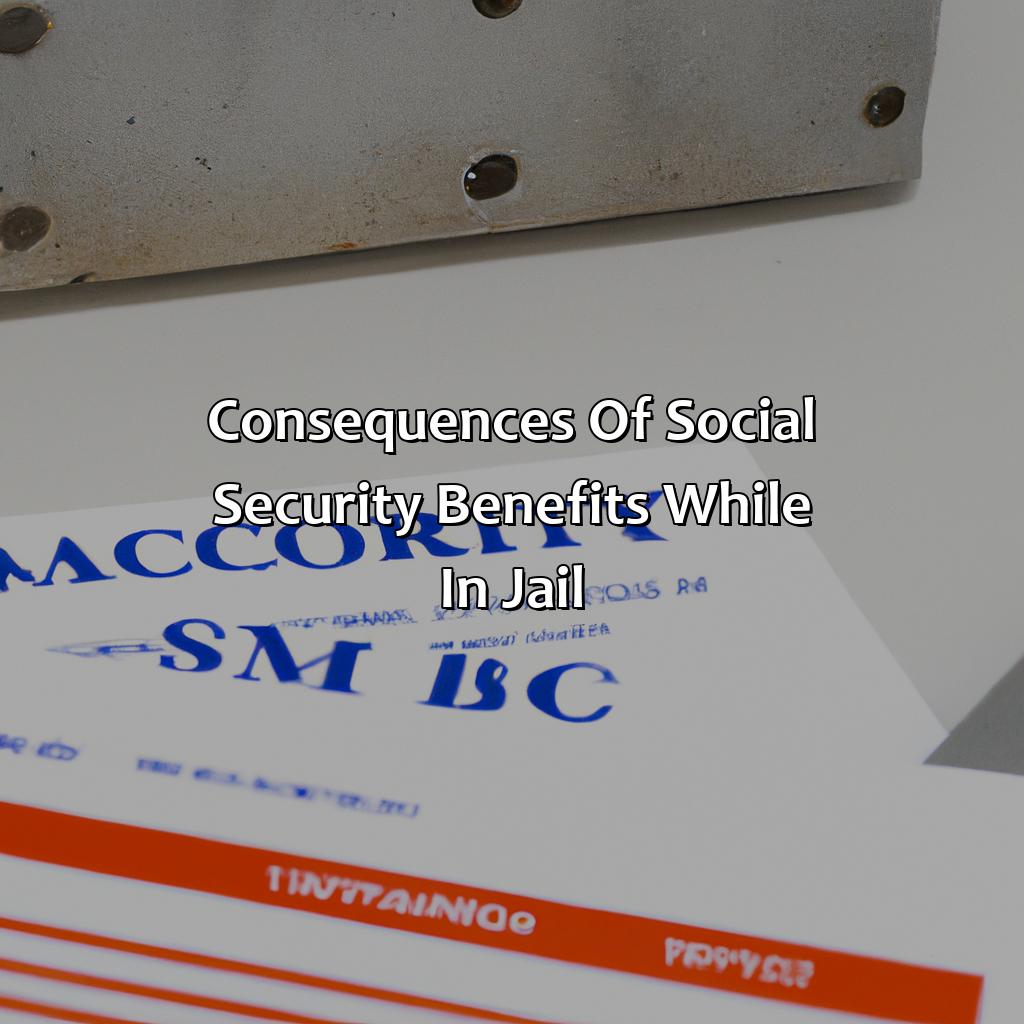
Image credits: retiregenz.com by David Jones
Suspension of Benefits
Social Security Benefits may be suspended if an individual is incarcerated for a crime. The suspension may begin in the month following the incarceration and would continue until the individual’s release from jail or prison. The benefits may also be suspended if a person is institutionalized in a hospital or nursing home at the public’s expense for more than 30 days. During this time, no payments will be made, but the benefits can be reinstated upon release.
If an incarcerated individual receives Social Security Disability Insurance (SSDI), their benefits may also cease after 12 months of continuous confinement. However, Supplemental Security Income (SSI) payments will stop immediately upon imprisonment. There are exceptions to these rules, such as if the individual’s spouse or child relies on their SSDI benefits for support.
It is crucial to inform Social Security as soon as possible if an individual knows that they will be incarcerated or institutionalized for an extended period so they can adjust their payments accordingly. Social Security has ways of finding out about someone’s incarceration through various government agencies such as prisons and jails, law enforcement databases, and other sources.
According to a report by the Social Security Administration (SSA) Office of Inspector General in 2012, erroneous benefit payments to prisoners reached almost $100 million in one year alone.
(Source: https://oig.ssa.gov/sites/default/files/audit/full/pdf/A-04-11-11115.pdf)
Why worry about overpayment issues when you can just let the government pay for your jail time instead?
Overpayment Issues
The Impact of Excess Payments due to Incarceration
Social Security benefits are subject to potential overpayments and make up for these mistakes by decreasing future payments. These overpayment issues arise when a beneficiary does not report changes in status, such as being incarcerated.
Continuous payment of Social Security while incarcerated leads to overpayments and additional financial strain on beneficiaries upon release. Overpayment refunds can also be deducted from future benefits, adding another obstacle upon release.
It is important to report any change of circumstances, such as incarceration or institutionalization, immediately to avoid these consequences.
According to the Social Security Administration’s (SSA) Office of the Inspector General, from 2008 to 2017, the SSA paid out $37 million in possible excess payments due to individuals who were later incarcerated.
Don’t worry, prison jumpsuits come in shades of gray that match your Social Security benefits paperwork perfectly.
Reporting Inmate Status to Social Security
Report your inmate status to Social Security! Two solutions: ‘Self-Reporting’ and ‘Reporting by Family Members or Third-Parties’. Weigh pros and cons to decide which is best. Don’t let your Social Security benefits be interrupted!
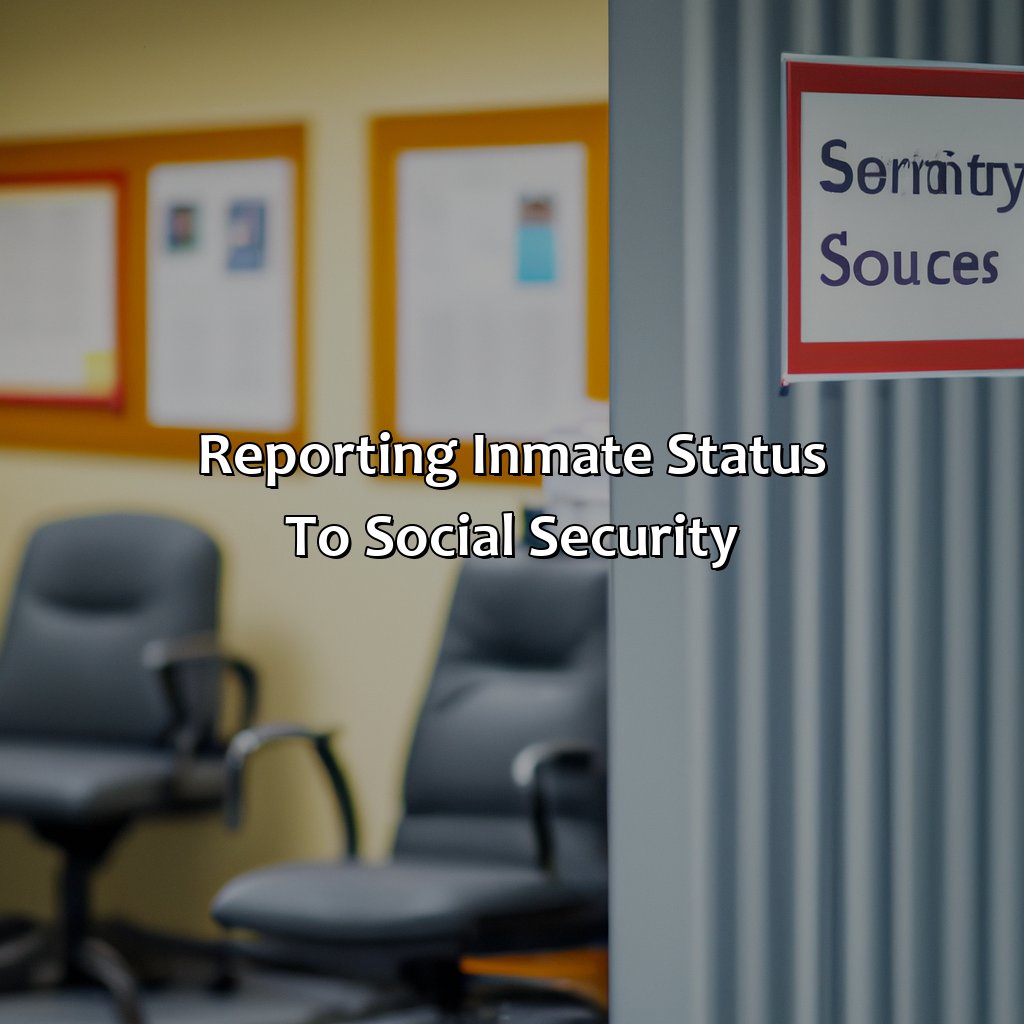
Image credits: retiregenz.com by Adam Washington
Self-Reporting
It is important to report any changes in your status, including incarceration, to Social Security as it may affect your benefits. This process is commonly known as Self-Reporting. Failure to do so may result in overpayments or even legal issues.
To self-report while incarcerated, you can provide a signed statement with your name, social security number, address of your current facility and expected release date. You can also request assistance from in-prison service providers who may have access to Social Security forms.
Once reported, Social Security will suspend payments until you are released from jail unless you are receiving benefits through a spouse or child’s account. If that’s the case, additional documentation must be provided to evaluate eligibility for continuing benefits.
Not reporting may also lead to the cancellation of healthcare benefits like Medicare and Medicaid. It’s critical to stay informed about rules affecting incarcerated individuals and their rights when it comes to federal programs like Social Security.
In 2016 alone, over 15,000 beneficiaries were identified through data matching programs as currently being incarcerated which resulted in over $140 million reductions in benefit payments.
This is the one time you don’t want your nosy Aunt Karen to report on your behalf.
Reporting by Family Members or Third-Parties
When informing Social Security of an individual’s incarceration, reporting by friends or associates may include several methods. People could either write to the Social Security Administration (SSA) or use online reporting systems to submit their information. Individuals can also reach out to local SSA offices in person or through phone calls. While family members and acquaintances who report incarceration are more commonly known, individuals having access to official records such as law enforcement personnel or healthcare providers might also report incarceration.
When a family member reports their status, they need to have a detailed account of the inmate’s full name, social security number, date of birth, and other relevant identification details. Moreover, they need to provide sufficient evidence such as court documents showing the individual’s conviction or prison sentencing. In addition to this, identity verification is essential when making a report.
Notably, not all reports submitted get acted upon by the SSA directly as reports may be passed from one state agency screening partner to another before getting passed on to the SSA for action. The process could lead to delayed updates in benefit payment suspension or denial causing unpredictable impacts on inmate families’ finances.
In May 2020, the Office of the Inspector General (OIG) issued a review that found that over 30 thousand inmates were potentially receiving improper payments due to incomplete reporting about their incarceration by correctional facilities. As part of its review process for compliance with prisoner eligibility requirements in federal benefit programs administered by SSA, OIG made recommendations applicable for continued improvement in monitoring efforts for people incarcerated federally.
Five Facts About How Social Security Finds Out You Are In Jail:
Social Security Administration (SSA) receives regular reports from correctional facilities which include an inmate’s personal information including name, social security number, date of birth, and incarceration date. (Source: SSA)
SSA uses these reports to suspend or stop a beneficiary’s payments while they are incarcerated. (Source: SSA)
If a beneficiary has outstanding overpayments or has been convicted of certain crimes, their payments may be suspended even after their release from jail. (Source: SSA)
Incarcerated individuals are not eligible to receive Social Security disability benefits, but may be eligible for Supplemental Security Income (SSI) if they meet certain criteria. (Source: SSA)
SSA has a special program called the Ex-Offender Initiative (EOI) which helps former inmates obtain benefits and navigate the Social Security system after their release. (Source: SSA)
FAQs about How Does Social Security Find Out You Are In Jail?
How does social security find out you are in jail?
Social security can find out if you are in jail through various means. They use data sources from law enforcement agencies and correctional institutions to find out the incarceration status of individuals receiving Social Security benefits.
Will my Social Security benefits be affected if I go to jail?
If you are in jail for more than 30 days, your Social Security benefits will be suspended. However, if you have a spouse or children who are eligible to receive benefits, they may continue to receive payments.
Do I have to notify Social Security if I go to jail?
Yes. If you are receiving Social Security benefits and are going to jail, you must notify the Social Security Administration (SSA) immediately. Failure to do so may result in overpayments that you will be required to pay back.
How long do I have to report my incarceration to Social Security?
You should report any incarceration lasting longer than 30 days to the Social Security Administration as soon as possible. Failure to do so may result in overpayments that you will be required to pay back.
What happens to my Social Security disability benefits if I am in jail?
If you are receiving Social Security disability benefits and are in jail for more than 30 days, your benefits will be suspended. However, you may be eligible to have the benefits reinstated upon your release.
Can I receive Social Security benefits while in jail for a misdemeanor offense?
Yes. If you are in jail for a misdemeanor offense, you may still be eligible to receive Social Security benefits. However, if you are in jail for more than 30 days, your benefits will be suspended.
 Checkout this IRS Loophole
Checkout this IRS Loophole 
